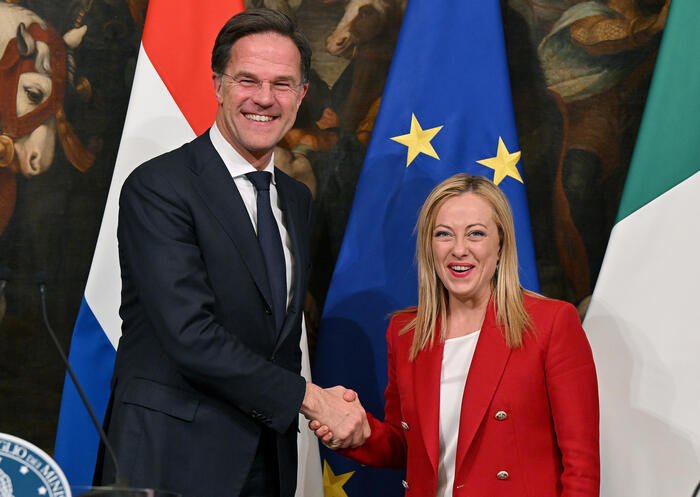Tightened up on EU public finances,
the European Commission is preparing for the return of common budgetary rules.
And he warns that by 2024 they will have to guarantee "medium-term debt sustainability" and promote "sustainable and inclusive" growth.
The message takes the form of 'guidelines' on fiscal policies.
However, it should be read as a warning: from the spring of 2024, procedures for excessive deficits could already be triggered on the current accounts, the bete noire of Brussels which requires the 'cicada' countries to pay back their accounts, in the case also with sanctions
.
The dossier is one of those followed closely by all governments.
The room for maneuver that the executives will have will depend on the choices.
"
In the Stability and Growth Pact, the theme of the balance between stability and growth must be taken into greater consideration
, both are necessary", commented the premier Giorgia Meloni who received a positive judgment from the Dutch premier Mark Rutte in Rome
.
"I am not worried by the Italian debt
- he said speaking to journalists on the sidelines of his meeting in Rome - The European Commission is in charge of this and
I am very impressed by what Italy is doing in implementing the reforms.
Italy is committed to making reforms and is implementing them step by step".
The passage of Brussels is a first step towards the new pact.
The states, the European executive announced, should take them into account in the execution of the 2023 budgets, in the preparation of the stability and convergence programs (which the countries present by the end of April defining the plans for the three-year period) and in the budget planning documents , the maneuver for 2024 'translated' for Brussels.
The limit not to be exceeded remains 3% of the deficit on gross domestic product set by the Treaties.
The current forecasts for the Italian deficit to 2023 are 4.5% (as indicated by the Nadef, to be reviewed with the April Def).
"It is a question of moving to more prudent fiscal policies," said Commission Vice-President
Valdis Dombrovskis.
In May, the Commission will give the 27 Member States its 'recommendations' (in the 'spring package')
with differentiated requirements based on debt sustainability challenges, seeking a balance between the current rules of the Stability Pact, suspended from the beginning of the pandemic, and the new ones in the process of being approved.
In line with the Pact reform envisaged by the Commission, a value will be indicated for net primary expenditure (net of one-off revenues and interest and unemployment expenditure), the single value that will replace the more complex indications of the old Pact on the 'output gap' (difference between actual and potential GDP) and structural deficit (ie adjusted for the economic cycle).
States, however, will be asked to reduce spending,
"It is important to move now towards a credible and solid framework", signaled the European Commissioner for the Economy Paolo Gentiloni.
However, "the general escape clause of the Stability and Growth Pact will be deactivated at the end of 2023"
.
For the Commission's package of legislative proposals on the new Pact, we are now looking to April, if, as expected, the green light will arrive
from the Ecofin council next Tuesday (March 14), with a declaration of "convergence" of the 27, net of the work still to do.
For the reform, at the moment there is no "situation of opposing trenches that has existed over the years on fiscal rules", Gentiloni pointed out.
The expected agreement "represents a very advanced compromise", "in the interest of the vast majority of European countries", he said.
For Italy "certainly there is a greater gradualness in the reduction of the debt, there is an incentive for investments which produces even greater gradualness in the reduction of the debt and therefore it is certainly an excellent operation".
A "balance" will have to be found to "maintain growth" and "absorb European resources" by reducing debt.
"I am confident that the Italian government is working in this direction".
However, "there is no possibility of returning to the old logic of austerity".
The recommendations by country, in addition to the indication of spending, will also provide a qualitative guide on investments and energy measures.
The Commission has once again called on countries to eliminate generalized subsidies against high energy prices, after spending on aid equal to 1.2% of European GDP in 2022 and at least 1% this year.

